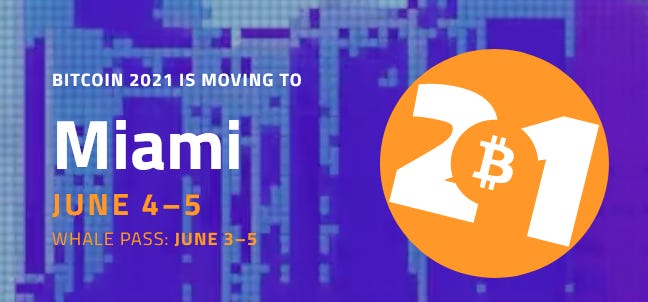Why We Need Bitcoin. Bitcoin Tech Talk #235
I prepared these remarks for the Texas Summit over the weekend and am publishing it again here.
It’s been said that “You don’t just move to Texas. Texas moves into you.” I can attest to this as I’m not a native Texan. Texas to me means freedom, liberty and the right to tell others to get off my lawn. We Texans care deeply about our liberties, and as we’ve seen this past year, our liberties are under threat.
There are many reasons why, but the reason that I want to talk about is money, specifically the monetary system that we all live under.
Monetary systems all over the world are being used to oppress people. China is creating a central bank digital currency which will allow for unprecedented levels of surveillance and control. Nigeria, Lebanon and Turkey are all in the early stages of hyperinflation, where their governments are stealing resources from their people through money printing. Governments in places like Belarus, Myanmar and Eritrea have financially de-platformed their opposition to prevent them from operating. These are just some examples of how governments use the monetary system as a means of control.
This sort of stuff isn’t just happening abroad. We’ve been seeing similar things in the US. US citizens are surveilled through reporting requirements that many banks have. The Federal Reserve is expanding the money supply, increasing the M2 money supply by over 30% during the last 12 months. During the Obama administration there was a program called “Operation Choke Point” which put pressure on banks to terminate accounts of businesses they didn’t like, such as gun shops and payday lenders. It’s not a stretch to think some day that bank accounts will start being terminated again and not just for gun shops or payday lenders. We may soon see the banking system used to threaten businesses who are not enforcing vaccine passports or who don’t have transgender bathrooms.
Undoubtedly, politics is the reason for these actions, but the current monetary system is ultimately what enables this level of oppression. Control of the monetary system is a power that no one should have. The monetary system currently enables the government to violate our property rights and control us. This is great for those in power, but for the rest of us, our liberties are being crushed and our freedoms are being trampled upon. The central-bank backed fiat monetary system that we all live under is the problem and the reason why those in power can continue their authoritarianism.
With Bitcoin, we can take this power back. Because Bitcoin does not have a central controller, each person can be their own bank. With Bitcoin we don’t have to fear the government de-platforming us from the financial system. With Bitcoin, we don’t have to fear direct seizure or stealth taxation via inflation. Bitcoin secures the most fundamental human right: Property rights
The case I make before you today is simple. Bitcoin is a powerful weapon to help Texans keep our financial sovereignty. Federal encroachment via monetary oppression is coming and in many ways is already here. Texas can be the first state to say no to this encroachment by adopting Bitcoin. Texas can be a leader in resisting the authoritarianism of the current monetary system. This past year has been a hard one for many and it’s time that we Texans take back our financial sovereignty and show the would-be overlords a thing or two. They will learn what we already know: you don’t mess with Texas.
Bitcoin
Bitcoin developers had an interesting way to settle the MTP vs Block Height debate on the Speedy Trial activation. They wanted to do a coin flip in a trustless way and essentially used the block hash in the future to do this. It turns out that the coin flip probably doesn’t matter given that AJ Towns and Andrew Chow have merged their MTP/Block Height approaches, meaning the coin flip won’t be used.
There’s a secure multisig setup being bandied about on the dev mailing list. There’s some controversy, particularly with respect to stateless wallets such as Trezor as the current proposal requires some storage and the encryption part of the protocol. As multisig really needs better UX than what we have now, this sort of proposal needs more review and feedback.
Congrats to the team at mempool.space who have received a grant to continue their work from Square and Gemini. I love the site and the accurate fee estimation it gives. I hope that the block explorer will be more easily deployable so I can host my own.
Lightning
The always informative Lightning Labs newsletter explores why Bitcoin isn’t just a digital rock. Among other tidbits, Lightning Bulb is a new site they launched for research questions about Lightning. For academics, this is likely a goldmine for interesting lines of inquiry. There’s also more ways to make money streaming data, music and other things, which look like excellent use cases for the Lightning Network.
Breez is partnering with Voltage to provide always-on Lightning nodes for the podcasters. This is a nice complement to the podcasting feature on Breez, which is made more for listeners. This removes the third parties like iTunes who take a chunk of the ad revenue and brings podcasters closer to their listeners economically. As I’ve said, Lightning is the decentralized web we’ve always wanted and this is definitely one of the apps that will get us there.
Economics, Engineering, Etc.
Ark Invest has a data-driven informative way to look at Bitcoin fundamentals. They have interesting metrics like coin-time destroyed, on-chain profit/loss, realized capitalization and much more. The post is worth reading just to understand what the various metrics mean and using them for your own analysis of the health of the Bitcoin network.
Beautyon makes the case for why the Crypto Council for Innovation is not a good thing. The council is made up of big companies in the space such as Fidelity, Coinbase and Square and his argument is that the consortium will inevitably ask for some democratic process for new features and slowly take over Bitcoin’s direction. I am surprised that they named themselves Crypto Council for Innovation instead of Bitcoin Council for Innovation but I’ll withhold judgment until they come out with some proposal. I will be opposing them vehemently if they do something against Bitcoin’s interests.
There’s a 15% premium in Bitcoin prices in South Korea again. Last time this happened was 2017 with around the same premium. Interestingly the Kimchi premium started around May 2017, meaning that if similar dynamics hold, we may be about 7 months out from the peak. It’s quite strange that this premium isn’t arbitraged down, but apparently, the capital controls for Korean citizens is around $10k, making this a hard arbitrage to do without some commercial entity.
Signal is launching a token. Stephen Diehl is not happy about it as are many others. They’ve been a privacy messaging app of choice for many people over the years but this move indicates that they’re having a tough time monetizing. That they chose to have a closed-source token indicates that it’s going to be highly centralized. I suspect this will cause a lot more people to check out projects like Sphinx for messaging, which will in turn cause even more growth of the Lightning network.
Peter Thiel has stated that he thinks Bitcoin might be a financial weapon against the US by China. If so, it would only behoove the US to accumulate Bitcoin, which might be the entire point of the statement.
Chips continue to be in high demand as TSMC cancels some price cuts. This is one of many industries where prices continue to go higher, like lumber, aluminum, copper and plastics. Not only does this mean that mining equipment is likely going to have some delays, but it also means that price increases in almost everything are going to hit like a tidal wave over the next 12 months.
Another week, another DeFi contract gets hacked.
Events
I am going to be at Texas A&M Bitcoin conference on April 16-17. This will be my first in-person conference since Bit Block Boom last summer.
I am also going to be at Bitcoin 2021 June 4-5.
I am starting up my Programming Blockchain seminar again. Next seminar is on June 1-2 in Miami and then on August 10-11 in Mexico. This is a 2-day seminar for programmers to learn about Bitcoin. You can apply here. I also have a few scholarships available for those that can’t afford it.
Podcasts, Etc.
I have a new Sphinx group for my podcast and newsletter.
On this week’s Bitcoin Fixes This, I talked to Tone Vays about risk management.
I also read through last week’s newsletter on clubhouse and recorded it. Listen here. I was on with Michael Saylor on the Bitcoin for Everybody series.
Here’s the new book:
Fiat delenda est.













